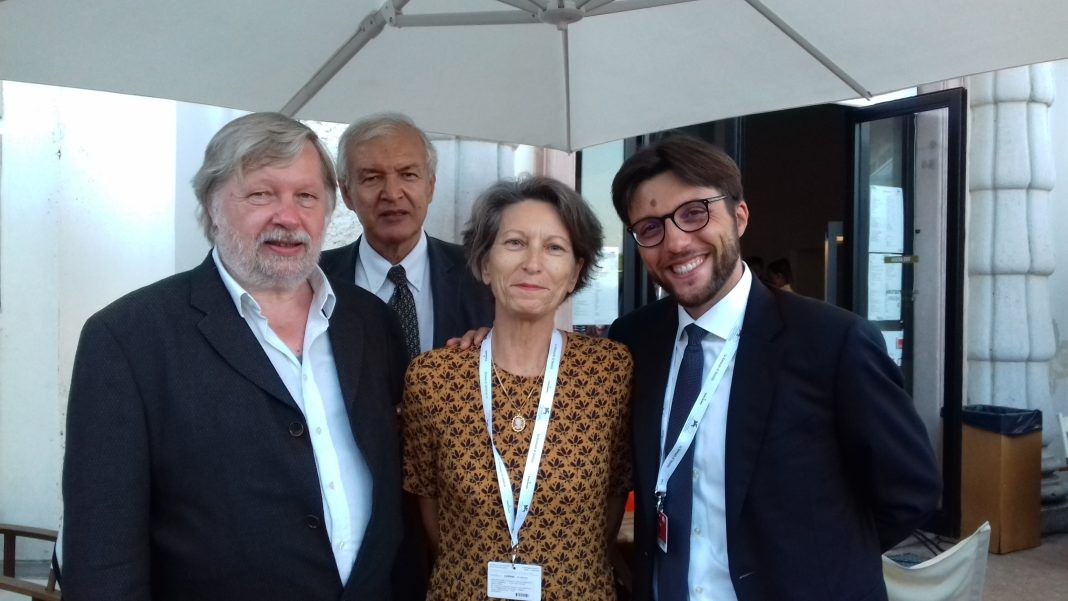By Janvier YAMEOGO
Guido Convents: an unconventional intellectual and researcher
Thanks to his background in history and anthropology, Guido naturally developed a passion for cinema, recognizing in the art of film the ability to weave connections between people and communities. A rigorous researcher, he combined humility and humor with disarming simplicity and a deep conviction that cinema and community media could foster dialogue, peace, dignity, and hope. His interest in films from the Global South, particularly African cinema, was an essential part of his personal and intellectual journey.
Thirsty for truth and genuine human relationships
“I knew all the rivers of Congo by name thanks to the images from missionaries,” he recalled during a meeting. “Every Saturday and Sunday I went to the foreigners’ club with Congolese, Senegalese, and Algerians. They would comment on Belgian politics in Africa. I also spent time with refugee students from Brazil, Argentina, and Chile who were fleeing dictatorships. I stayed with them, we watched television, and they would start shouting whenever they heard the explanations of our politicians. To them, they were lies. They critically explained the situation to me and gave me their version of colonization.”
This shaped Guido’s view of cinema and communication as a narrative of the world. Committed to decolonizing screens and minds, and painstakingly cultivating a critical gaze, he was sometimes labeled as subversive or even anarchist.
The birth of the Afrika Filmfestival in Leuven
In 1996, during the large fair “Vierkant voor Afrika – Wholeheartedly for Africa,” which brought together Flemish NGOs active in Africa with some 20,000–30,000 people in attendance, Guido Convents realized that there were no Africans explaining the situation, while NGOs discussed Africa’s problems and their solutions. The few Africans present were not allowed to speak; they were there only to play the djembe or sell bracelets.
From this indignation was born the Afrika Filmfestival in Leuven, with the aim of “paying tribute to Africans” and showing audiences films capable of deconstructing stereotypes. Every year, the Festival receives around 2,500–3,000 films and brings together more than 400 volunteers who contribute with determination to its realization, promoting humanization through culture in the belief that images can transform lives and foster equal dignity for all.
“I know all the people I mention in the book,” Guido explained. “I specialized, I make an effort to meet them.” In his book L’Afrique? Quel cinéma! Un siècle de propagande coloniale et de films africains (2003), he compiled an annotated list of colonial films, some of which were even produced with the support of African governments.
Georges Nzuzi Salambiaku, president of the ACCC (Congolese Association of Film Critics), remembers him in these words:
“Guido was a person of great impact and supported the birth of numerous film initiatives in Africa, particularly in the Democratic Republic of Congo, with the creation of the ACCC. Guido helped weave a worldwide network of critics. He gave voice to African cinema, defending an independent and value-driven narrative, originating mainly from Africa and the Global South, with the constant concern of humanizing the seventh art, culture, and media in general.”
In the face of today’s wars and conflicts, Guido Convents’ intuition resonates with renewed relevance in the post-truth era: to recover critical thinking and always seek the truth, even when it is uncomfortable and unsettling. In an age where reality is mediated through filters, the decisive battle is fought in language—in the fragile yet crucial space of the words we choose to paint daily life.






